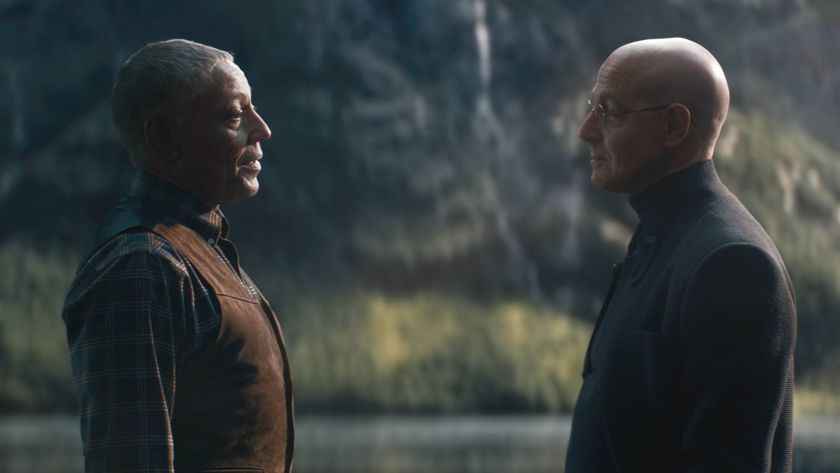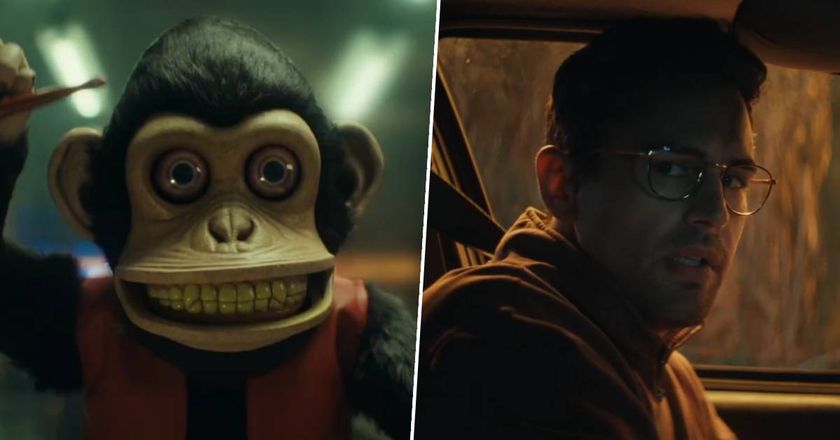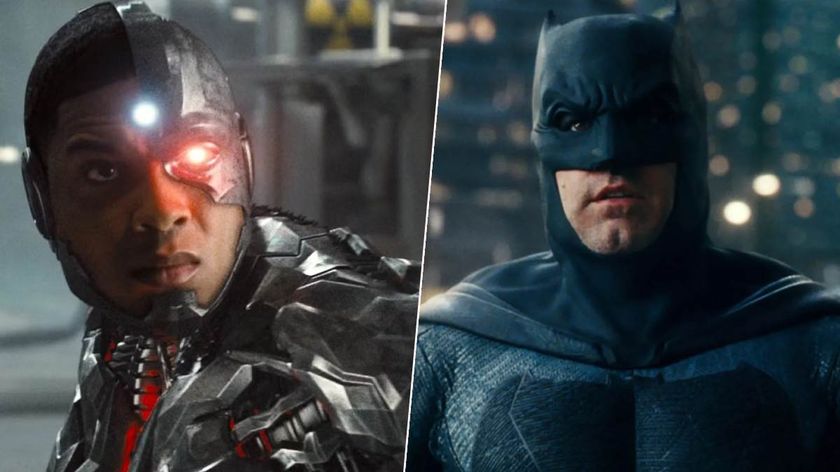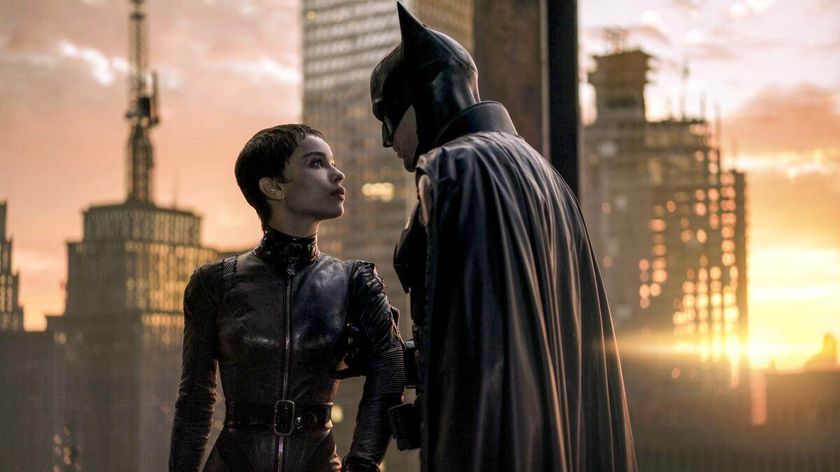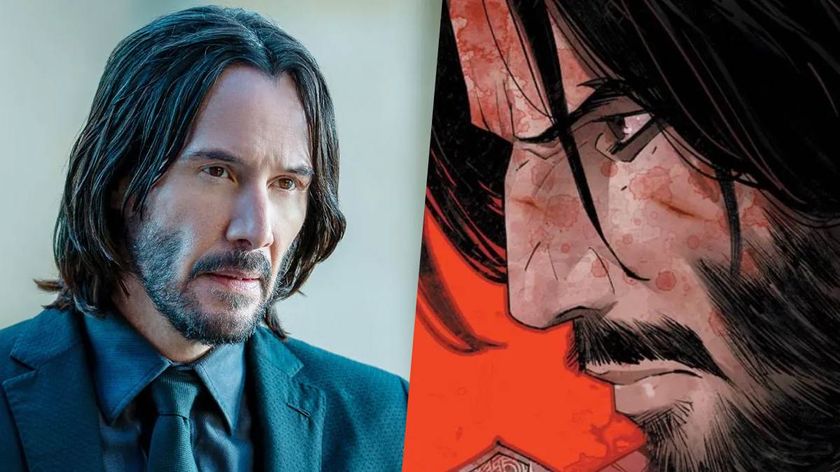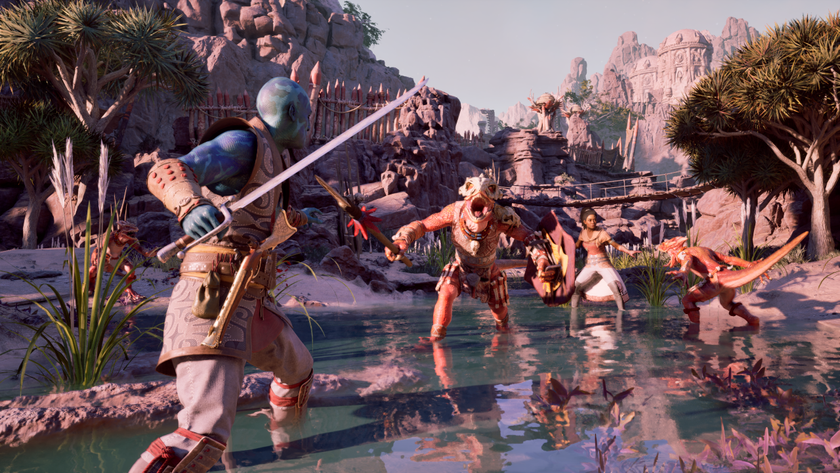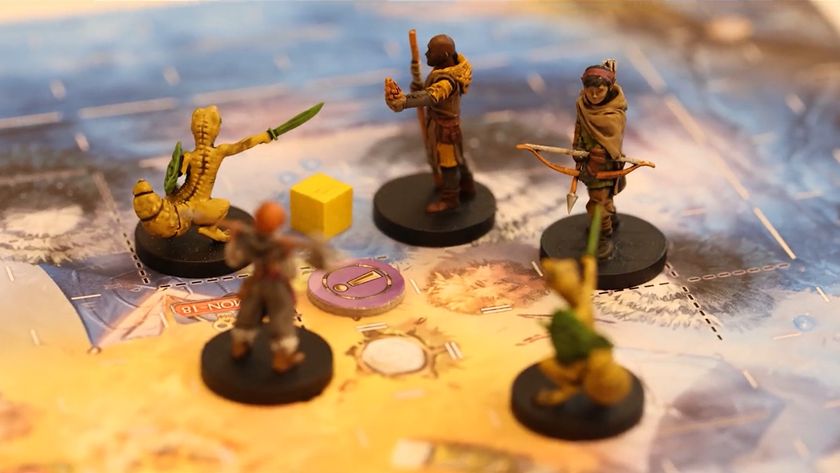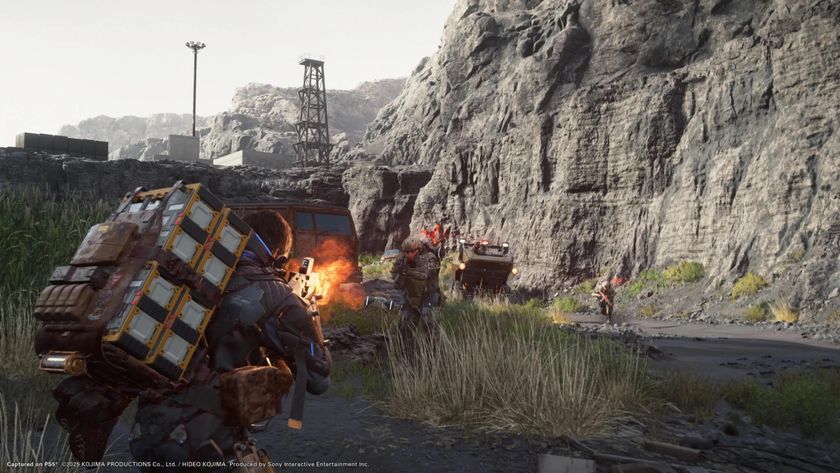Movies to watch this week at the cinema: The Witch, Anomalisa, Kung Fu Panda 3, more...
Out on Friday 11 March
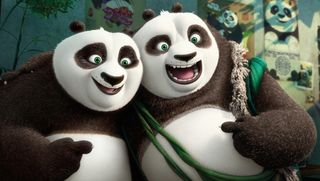
Robert Eggers' horror debut favours insidious dread over cheap shocks. Charlie Kaufman adds another string to his bow. An animated sequel eats shoots and scores.
Yes, here's this week’s new releases. Click on for our reviews of The Witch, Anomalisa, Kung Fu Panda 3, The Divergent Series: Allegiant, The Here After, The Ones Below, and Next To Her.
For the best movie reviews, subscribe to Total Film.
THE WITCH

The biggest threat in George Romero's zombie movies isn’t the lurching, flesh-chomping hordes but the surviving humans' inability to pull together; from discord and disharmony come death. Much the same can be said of Robert Eggers’ scrupulously chilling debut.
Subtitled 'A New-England Folktale' and gleaning some of its roughhewn, period-poetic diction from journals written in the mid-17th century, The Witch, for all its genre know-how, would work almost as well if stripped of supernatural elements.
Yes, there are images of unnatural happenings so potent as to elicit audible gasps from the audience. But the fracturing of a family at the narrative's poisoned heart can equally be attributed to the severity of patriarchal rule, fanatical religion and hardscrabble agrarian life.
The 1630s. Banished from a plantation for his proudly stubborn beliefs, a farmer, William (Ralph Ineson), takes his wife, Katherine (Katie Dickie), and five children to set up home on the edge of a wood. Here, in striking isolation, the atmosphere incrementally ratchets from disquietude to hysteria over 90 taut, unforgiving minutes. It begins when the youngest child, an infant named Samuel, inexplicably disappears while being safeguarded by his teenage sister, Thomasin (Anya Taylor-Joy).
Sign up for the Total Film Newsletter
Bringing all the latest movie news, features, and reviews to your inbox
The loss leads to guilt, prayers and recriminations, all intensified when the crop fails. Then Caleb (Harvey Scrimshaw), the second eldest after Thomasin, is found catatonic in the woods. The family is imploding, and it's not long before young twins Mercy and Jonas (Ellie Grainger, Lucas Dawson) are taking their older sister at her taunting word and proclaiming her a witch. Worse, their mother and father are paying heed…
Conjuring the spirit of such convincing occult dramas as Carl Theodor Dreyer's Day Of Wrath, Michael Reeves’ Witchfinder General and Piers Haggard’s The Blood On Satan’s Claw, The Witch favours verisimilitude, formal exactitude and insidious dread over cheap shocks.
Eggers, a native of New England, unfailingly transports viewers to a forbidding time and place through the specificity of his costumes, sets and sound design, while DoP Jarin Blaschke’s austere images are painted in natural light – and, of course, darkness; the pale moon and flickering candles can rarely brighten the edges of the frame.
Such stylistic rigour is in opposition to the found-footage films that have dominated the horror genre this century. In place of smeared visuals delivered by churning cameras is a gallery of precisely framed pictures. Exteriors comprise misty greys and sepulchral greens; those candle-lit interiors possess an amber tint evocative of silent cinema.
In fact, the only bright spots in Eggers' film are the flashes of red – a cloak during an especially heart-stopping sequence and sheets of blood that can’t be scrubbed from viewers' eyeballs, such is the viciousness and veracity with which they’re unloosed.
The Witch is a slow film, a sincere film, accumulating atmosphere one shiver at a time. The wind whistles, the farmyard animals grunt and the birds caw; the score, all caterwauling cellos and choral chants, is the Devil’s orchestra – the sonic equivalent of a Hieronymus Bosch painting.
But after all the suggestion, shadows and shudders, Eggers is not afraid to show and tell, and demonstrates a neat knack for composing nightmare images. One involves a goat, another a raven: Satanic staples both but here treated in ways that are anything but hoary.
The climax, too, pours new blood from old bottles, and is scary enough to mute arguments that Eggers might have done better to not sacrifice ambiguity for full-throttle terror. (As John Carpenter said when asked about embracing show-stopping visuals with The Thing after the purist suspense of Halloween, when you’ve got something this good, you don’t hide it.)
The Witch is perhaps too slow and its dialogue too archly archaic for it to be this year's crossover horror hit a la It Follows, but if you like the thought of The Exorcist taking place in Terrence Malick's The New World, then this is for you. It certainly rewards patience, and all credit to Eggers and his cast for sticking to their beliefs.
The performances, like the direction, are unswerving in their conviction, and special mention should go to Anya Taylor-Joy as Thomasin. A real find, her pale face demands scrutiny – blank and expressive, guileless and cunning – just as her changing body mesmerises Caleb.
The Witch is, after all, a prologue to the Salem witch trials, so it is correct that an unhealthy fear of female sexuality should be stirred into the brew of religious fundamentalism and plain old cabin fever. It’s Eggers’ ability to keep the lid on all this bubbling hysteria until the very moment he wants it to blow sky-high that makes The Witch so effective.
THE VERDICT: Robert Eggers' measured, meticulous debut builds into one of the most genuinely scary horror movies of recent years.
Director: Robert Eggers; Starring: Anya Taylor-Joy, Ralph Ineson, Katie Dickie, Harvey Scrimshaw; Theatrical release: 11 March 2016
Jamie Graham
ANOMALISA
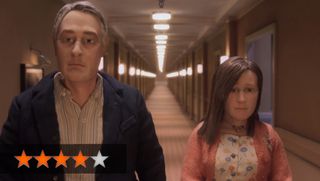
Charlie Kaufman returns from a seven-year absence with a stop-motion animation populated by foot-tall puppets made of metal, rubber and glass.
All but two of the puppets – male, female, adult, child – are voiced by Tom Noonan, and the majority of the action plays out in a hotel named Al Fregoli, as in 'Fregoli delusion', a psychiatric disorder whereby the sufferer believes everybody else is in fact the same person in a variety of disguises. And there’s a puppet sex scene that has landed Anomalisa an R-rating in the US for 'graphic nudity'.
Yet far from being the most 'Kaufmanesque' (read: bonkers) offering to date from the brain behind Being John Malkovich, Adaptation., Eternal Sunshine Of The Spotless Mind and Synecdoche, New York, this is his most human and recognisable work.
Adapted from Kaufman's 'sound play', funded on Kickstarter and co-directed by Duke Johnson (the man behind the stop-motion Christmas episode of Community), Anomalisa sees inspirational speaker Michael Stone (voiced, perfectly, by David Thewlis) fly into Cincinnati to lecture a convention of customer service professionals.
Ensconced in his hotel room, he ponders his rocky marriage, arranges a disastrous drink with an ex and generally languishes in existential despair. Then, out of the drone of voices that fill the hotel (all, remember, voiced without modulation by Noonan), he hears a unique cadence – and so begins a startling night of connection with Lisa (Jennifer Jason Leigh, superb), a shy-but-garrulous small-town telesales agent.
No stranger to the promotional duties that come with releasing a film, Kaufman clearly knows, all too well, the life of jetting into cities to stay a single night in a blandly tasteful hotel, and the manifold details of Anomalisa's contained world are precisely correct.
Crucially, this observational keenness extends beyond furnishings and elevator muzak to human behaviour, with Michael's funk, and his heart’s unexpected swelling upon meeting the anomaly that is Lisa, guaranteed to elicit a quivering emotional response from viewers.
And as for that sex scene… it's closer to the desperate awkwardness of Blue Valentine’s motel encounter than the hilarious smut of Team America, though there are gentle laughs, plus tenderness and, yes, eroticism.
After 2015 brought us such splendours as Inside Out, Shaun The Sheep Movie Everything and Song Of The Sea – amplifying claims that we're enjoying a golden age of animation – 2016 has a lot to live up to. Anomalisa suggests it might just do it.
THE VERDICT: Charlie Kaufman shows us what it is to be human. Plus the best use of Cyndi Lauper's 'Girls Just Want To Have Fun' in the movies.
Directors: Charlie Kaufman, Duke Johnson; Starring: David Thewlis, Jennifer Jason Leigh, Tom Noonan; Theatrical release: 11 March 2016
Jamie Graham
THE DIVERGENT SERIES: ALLEGIANT
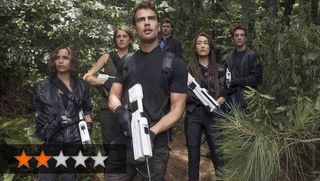
First, the good news: after Insurgent – aka Divergent 2 – tapped out that grey, sim-city-fighting mood, this shiny threequel abseils over the giant wall surrounding dystopian Chicago and smartly drops us into a vibrantly scarlet, Martian-looking landscape, where even the toxic rain is red. Director Robert Schwentke even kicks the enjoyably sub-Mad Max extreme-sport action sequences into a higher gear than previous instalments.
But he’s banjaxed when the plot dictates that Tris (Shailene Woodley) and her fellow rebels are whisked to CGI-laden genetic-engineering biodome The Bureau. Here, the high-school hokum of the Divergent 'factions' becomes high-tech eugenics, as kindly director David (a twinkling Jeff Daniels) determines that only Tris’ ‘pure’ genes can save blighted mankind.
Always fond of pseudo-science and ethical quandaries, the Divergent series reaches a new, mildly pretentious peak here. There’s even a double-helix Bureau staircase, to underline the science-y symbolism. But its sort-of topical themes of genetic exclusion, surveillance, racism and ignoring neighbouring conflict (Chicago is riven by tribal warfare between the Factionless and those 'Allegiant' to the old system) don’t translate into meaty exploits.
Instead the film favours wide-eyed wrangling between Tris and boyfriend Tobias (Theo James, positively square-jawed with righteousness). The chief joy of the series, Shailene Woodley’s tenacious but vulnerable Tris, seems to be unusually Redundant, sidelined into ‘pure’ passivity while Tobias is Resurgent, muscling through mysteriously violent Marine-style Bureau raids like an action hero. Still, his racing around stops the film flopping too frequently into the repetitive rows that replace heated clinches this time out.
Splitting the final book into two movies (Ascendant is due next summer) should have given Allegiant endless plot possibilities to play with. Instead it drags out the Bureau business, with only the eye-candy compensations of cool space-age kit (drone-led gun battles, spaceship crashes, VR surveillance pods).
And though we're asked to invest in the fate of the Chicago inhabitants as well as Team Tris, we see only slivers of the Allegiant vs Factionless war. Nowhere near enough action, then – but at least the ending is an absolute gas…
THE VERDICT: This over-extended teen dystopia is treading water, coming up short on its trademark punchy plotting, teen self-discovery and the wonderful Woodley.
Director: Robert Schwentke; Starring: Shailene Woodley, Theo James, Naomi Watts, Jeff Daniels, Octavia Spencer, Zoe Kravitz, Miles Teller, Ansel Elgort; Theatrical release: 10 March 2016
Kate Stables
KUNG FU PANDA 3
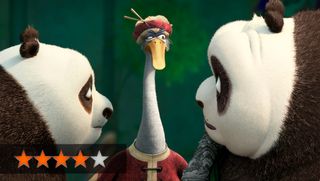
DreamWorks' chop-socky saga has always been a bit of an odd one. Plus-size panda Po (Jack Black) is a superhero slacker who can dropkick an entire army of ninja rhinos but still has trouble walking up the stairs. He's been raised by a goose, trained by Dustin Hoffman and is in a gang with five A-list animal Avengers who never really do very much. Luckily, three films in, the franchise is still hilarious, still slickly animated and still able to kick furry butt.
Mixing the training montages of the first film (2008) with the soul searching of the second (2011), part three is pure Star Wars. Po must learn to master the Force-like power of ch'i and find out who his father really is before the new dark side baddie sucks him into the spirit realm with an army of jade zombies. Along the way, our hero takes a detour to his long-lost homeland (a cute mountaintop panda sanctuary that steals jokes from every YouTube video ever shared) and patches things up with his adoptive goose dad before facing an epic final set-piece that feels every inch the trilogy-closer.
Some of the newbies are grossly underused (Kate Hudson's sassy panda-ess Mei Mei gets a cracking introduction and then disappears from the film altogether), but J.K. Simmons' gravel-voiced demon bull Kai and, most notably, Bryan Cranston's bumbling Li both threaten to steal the film. It's still Black’s show, though. Keeping up the knockout quips and making Po seem as huggable as possible amid all the flying feet and fists, he helps the series feel ever more heartfelt with age. Animated with exceptional depth and beauty by co-directors Jennifer Yuh and Alessandro Carloni (and given epic new heft by Hans Zimmer in the orchestra pit), it's a rare ’toon franchise that can grow up so quickly and still giggle at its own butt jokes.
THE VERDICT: DreamWorks' follow-up ratchets up the awesomeness again – with more heart, more fun and at least two new characters you’d happily welcome back for a four-quel.
Directors: Alessandro Carloni, Jennifer Yuh; Starring: Jack Black, Bryan Cranston, Dustin Hoffman, Angelina Jolie, J.K. Simmons; Theatrical release: 11 March 2016
Paul Bradshaw
THE HERE AFTER
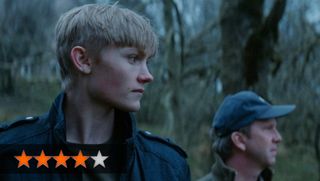
Combustible material benefits from compelling control in this debut from Sweden's Magnus von Horn. Swedish pop star Ulrik Munther is persuasively sulky as John, a teenager released to his community and farming family after a stint inside for a slow-revealed crime.
Going straight is hard: locals attack him, schoolmates throw punches, school newbie Malin's (Loa Ek) interest doesn’t help much. Violence seems inevitable but Von Horn plots cause and consequence with patient precision: his tale of crime, culpability and rough justice leaves a more lingering impression for it
Director: Magnus Von Horn; Starring: Ulrik Munther, Mats Blomgren, Loa Ek, Wieslaw Komasa, Inger Nilsson; Theatrical release: 11 March 2016
Kevin Harley
THE ONES BELOW

Beginning on an alien-looking ultrascan and unafraid to explore aspects of pregnancy not often shown on screen, writer/director David Farr's London-set chiller is both frank and fraught with parental anxiety.
Clémence Poésy and Stephen Campbell Moore are the harried parents-to-be; Laura Birn and David Morrissey their too-perfect downstairs neighbours, also expecting. You don’t need to be Nostradamus to see trouble brewing, but it's a quality effort that unsettles even as it gets silly, with Poésy's convincingly spooked performance holding things together when subtlety finally flees the party.
Director: David Farr; Starring: Clémence Poésy, David Morrissey; Theatrical release: 11 March 2016
Matt Glasby
NEXT TO HER
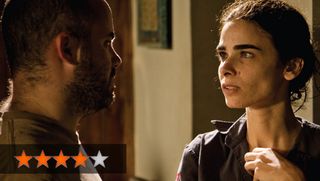
Israeli director Asaf Korman's debut draws on personal experience: it's inspired by the relationship between his wife, Liron Ben-Shlush (who also writes and stars), and her mentally disabled sister. Struggling to cope on her own, Chelli (Ben-Shlush) is forced to leave her sister Gabby (Dana Ivgy) in a day-care programme.
With both women unhealthily dependent on each other, the rift causes more problems than it solves, with Chelli seeking awkward solace in a new boyfriend. It might leave you utterly traumatised, but this is one of the most daring, sensitive love stories in recent memory.
Director: Asaf Korman; Starring: Liron Ben-Shlush, Dana Igvi; Theatrical release: 11 March 2016
Paul Bradshaw
The Total Film team are made up of the finest minds in all of film journalism. They are: Editor Jane Crowther, Deputy Editor Matt Maytum, Reviews Ed Matthew Leyland, News Editor Jordan Farley, and Online Editor Emily Murray. Expect exclusive news, reviews, features, and more from the team behind the smarter movie magazine.
